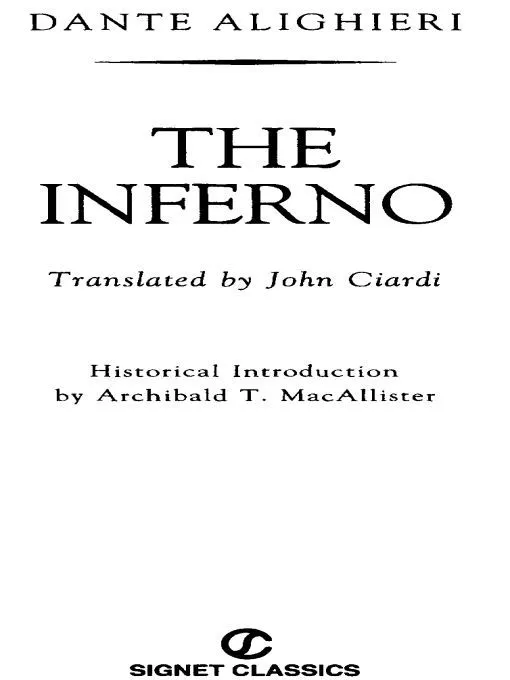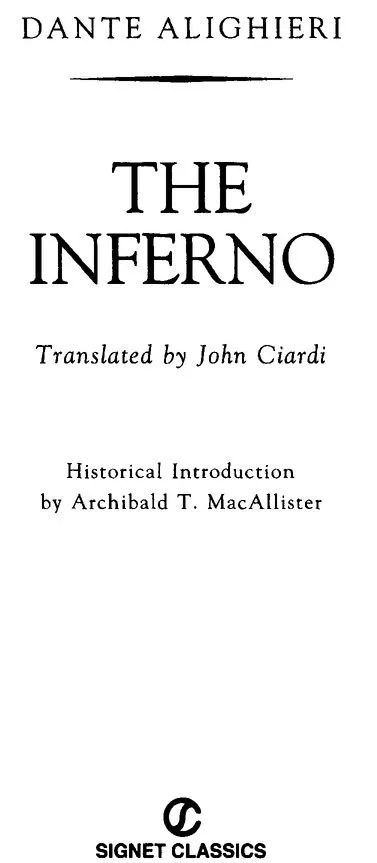The Inferno

Table of Contents
Title Page
Copyright Page
Dedication
Introduction
Canto I - The Dark Wood of Error
Canto II - The Descent
Canto III - THE VESTIBULE OF HELL
Canto IV - CIRCLE ONE: Limbo
Canto V - CIRCLE TWO
Canto VI - CIRCLE THREE
Canto VII - CIRCLE FOUR
Canto VIII - CIRCLE FIVE: Styx
Canto IX - CIRCLE SIX
Canto X - CIRCLE SIX
Canto XI - CIRCLE SIX
Canto XII - CIRCLE SEVEN: Round One
Canto XIII - CIRCLE SEVEN: Round Two
Canto XIV - CIRCLE SEVEN: Round Three
Canto XV - CIRCLE SEVEN: Round Three
Canto XVI - CIRCLE SEVEN: Round Three
Canto XVII - CIRCLE SEVEN: Round Three
Canto XVIII - CIRCLE EIGHT (Malebolge)
Canto XIX - CIRCLE EIGHT: Bolgia Three
Canto XX - CIRCLE EIGHT: Bolgia Four
Canto XXI - CIRCLE EIGHT: Bolgia Five
Canto XXII - CIRCLE EIGHT: Bolgia Five
Canto XXIII - CIRCLE EIGHT : Bolgia Six
Canto XXIV - CIRCLE EIGHT: Bolgia Seven
Canto XXV - CIRCLE EIGHT: Bolgia Seven
Canto XXVI - CIRCLE EIGHT: Bolgia Eight
Canto XXVII - CIRCLE EIGHT: Bolgia Eight
Canto XXVIII - CIRCLE EIGHT: Bolgia Nine
Canto XXIX - CIRCLE EIGHT: Bolgia Ten
Canto XXX - CIRCLE EIGHT: Bolgia Ten
Canto XXXI - THE CENTRAL PIT OF MALEBOLGE
Canto XXXII - CIRCLE NINE: Cocytus
Canto XXXIII - CIRCLE NINE: Cocytus
Canto XXXIV - NINTH CIRCLE: Cocytus
“It is Mr. Ciardi’s great merit to be one of the first American translators to have ... reproduced [The Inferno] successfully in English. A text with the clarity and sobriety of a first-rate prose translation which at the same time suggests in powerful and unmistakable ways the run and rhythm of the great original ... a spectacular achievement.”
—Archibald MacLeish
“Fresh and sharp.... I think this version of Dante will be in many respects the best we have seen.”
—John Crowe Ransom
DANTE ALIGHIERI was born in 1265. Considered Italy’s greatest poet, this scion of a Florentine family mastered the art of lyric poetry at an early age. His first major work, La Vita Nuova (1292), was a tribute to Beatrice Portinari, the great love of his life. Dante’s political activism resulted in his being exiled from Florence, and he eventually settled in Ravenna. It is believed that The Divine Comedy—comprising three canticles, The Inferno, The Purgatorio, and The Paradiso-was written between 1308 and 1320. Dante Alighieri died in 1321.
JOHN CIARDI was a distinguished poet and professor, having taught at Harvard and Rutgers universities, and a poetry editor of The Saturday Review. He was a Fellow of the American Academy of Arts and Sciences and the National Institute of Arts and Letters. In 1955, he won the Harriet Monroe Memorial Award, and in 1956, the Prix de Rome. He died in 1986.

SIGNET CLASSICS
Published by New American Library, a division of
Penguin Group (USA) Inc., 375 Hudson Street,
New York, New York 10014, USA
Penguin Group (Canada), 90 Eglinton Avenue East, Suite 700, Toronto,
Ontario M4P 2Y3, Canada (a division of Pearson Penguin Canada Inc.)
Penguin Books Ltd., 80 Strand, London WC2R ORL, England
Penguin Ireland, 25 St. Stephen’s Green, Dublin 2,
Ireland (a division of Penguin Books Ltd.)
Penguin Group (Australia), 250 Camberwell Road, Camberwell, Victoria 3124,
Australia (a division of Pearson Australia Group Pty. Ltd.)
Penguin Books India Pvt. Ltd., 11 Community Centre, Panchsheel Park,
New Delhi - 110 017, India
Penguin Group (NZ), 67 Apollo Drive, Rosedale, North Shore 0632,
New Zealand (a division of Pearson New Zealand Ltd.)
Penguin Books (South Africa) (Pty.) Ltd., 24 Sturdee Avenue,
Rosebank, Johannesburg 2196, South Africa
Penguin Books Ltd., Registered Offices:
80 Strand, London WC2R ORL, England
Published by Signet Classics, an imprint of New American Library, a division of
Penguin Group (USA) Inc. Previously published in a Mentor edition.
First Signet Classics Printing, June
Copyright © John Ciardi, 1954, 1982
All rights reserved
eISBN : 978-1-101-07803-7
 REGISTERED TRADEMARK—MARCA REGISTRADA
REGISTERED TRADEMARK—MARCA REGISTRADA
Without limiting the rights under copyright reserved above, no part of this publication may be reproduced, stored in or introduced into a retrieval system, or transmitted, in any form, or by any means (electronic, mechanical, photocopying, recording, or otherwise), without the prior written permission of both the copyright owner and the above publisher of this book.
The scanning, uploading and distribution of this book via the Internet or via any other means without the permission of the publisher is illegal and punishable by law. Please purchase only authorized electronic editions, and do not participate in or encourage electronic piracy of copyrighted materials. Your support of the author’s rights is appreciated.
http://us.penguingroup.com
To Judith
Cosi n’andammo infino alla lumiera,
parlando cose, che il tacere è bello,
si com’ era il parlar colà dov’ era.
Translator’s Note
When the violin repeats what the piano has just played, it cannot make the same sounds and it can only approximate the same chords. It can, however, make recognizably the same “music,” the same air. But it can do so only when it is as faithful to the self-logic of the violin as it is to the self-logic of the piano.
Language too is an instrument, and each language has its own logic. I believe that the process of rendering from language to language is better conceived as a “transposition” than as a “translation,” for “translation” implies a series of word-for-word equivalents that do not exist across language boundaries any more than piano sounds exist in the violin.
The notion of word-for-word equivalents also strikes me as false to the nature of poetry. Poetry is not made of words but of word-complexes, elaborate structures involving, among other things, denotations, connotations, rhythms, puns, juxtapositions, and echoes of the tradition in which the poet is writing. It is difficult in prose and impossible in poetry to juggle such a complex intact across the barrier of language. What must be saved, even at the expense of making four strings do for eighty-eight keys, is the total feeling of the complex, its gestalt.
The only way I could see of trying to preserve that gestalt was to try for a language as close as possible to Dante’s, which is in essence a sparse, direct, and idiomatic language, distinguishable from prose only in that it transcends every known notion of prose. I do not imply that Dante’s is the language of common speech. It is a much better thing than that: it is what common speech would be if it were made perfect.
One of the main sources of the tone of Dante’s speech is his revolt from the Sicilian School of Elegance. Nothing would be more misleading than to say that Dante’s language is simple. Overwhelmingly, however, it seeks to avoid elegance simply for the sake of elegance. And overwhelmingly it is a spoken tongue.
I have labored therefore for something like idiomatic English in the present rendering.
1 comment